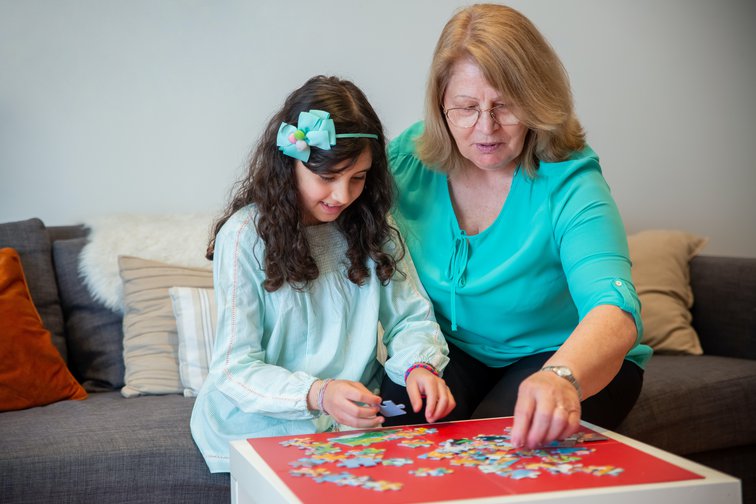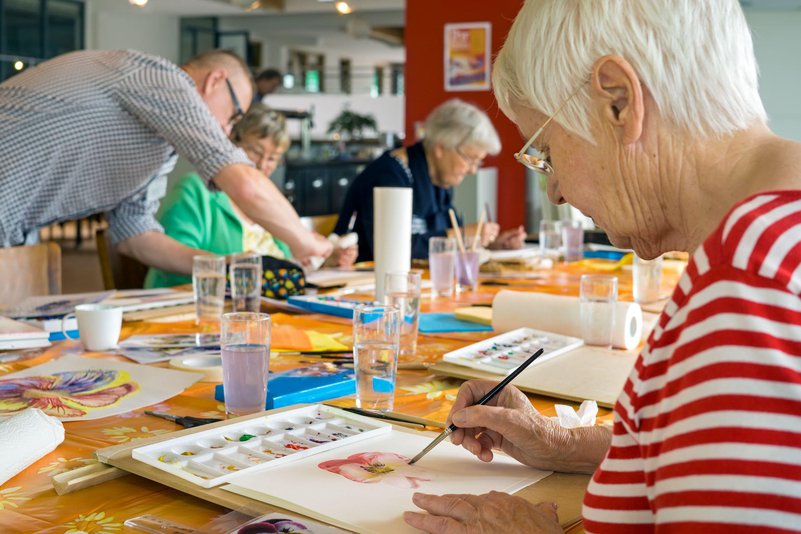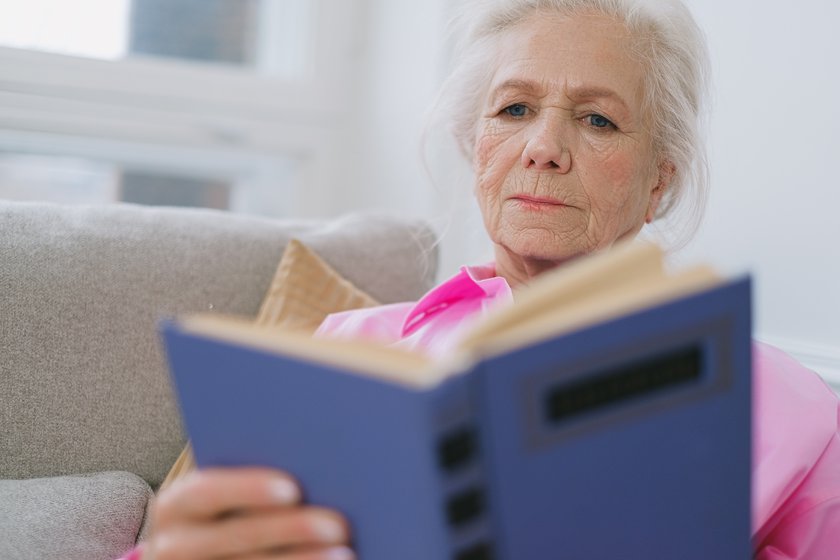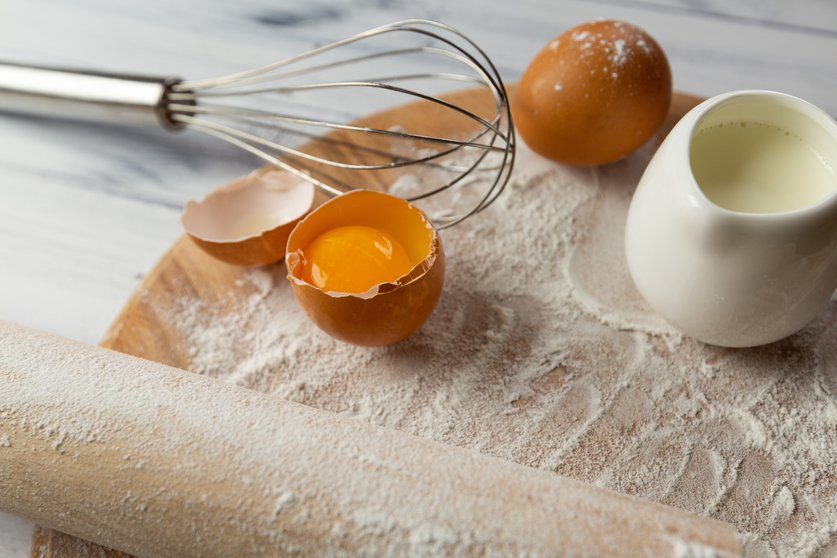
As the chilly British winter weather approaches, you may wonder about various ways to keep your older relatives entertained and stimulated indoors.
It is essential that we look out for our older loved ones throughout the year and ensure they are exercising their cognitive skills to help prevent them from experiencing loneliness or boredom.
According to one study by Ronan M Conroy, 'Loneliness and boredom-proneness are associated with reduced cognitive function in older age, and cluster with other factors associated with cognitive reserve.'
We have compiled a list of five indoor winter activities that offer cognitive benefits for older adults. Hopefully, these ideas will help your loved one remain amused and happy this winter!
Top 5 Indoor Winter Activities for older people...
1. Jigsaw puzzles
Jigsaw puzzles are a great hobby for older adults to enjoy during the winter months. Just like humans, puzzles come in all kinds of different shapes and sizes! Puzzles are brilliant for exercising the brain and can be done as a social activity with the family. Nothing beats the feeling of accomplishment when you place the final jigsaw piece!

Benefits:
- Improved memory
- Increased IQ
- Improved mood
- Improved problem-solving skills
- Lower stress-levels
- Improved visual-spatial reasoning
Best places to get jigsaw puzzles:
- Local Charity shops - Find charity shops near you using Charity Retail Association's 'Find a charity shop' tool. Most charity shops will have a great selection of pre-loved or even brand-new jigsaw's to choose from!
- Swap with friends - Do you or your loved one have any fellow jigsaw-puzzler friends? Why not help each other out and swap the ones you've completed?
- In-store retailers - John Lewis, The Works & WHSmith are all popular High Street retail stores that sell a lovely range of puzzles from wildlife scenes, to seaside towns or beautiful landscapes.
- Online retailers - Amazon, eBay and Photobox are all brilliant online retailers that sell a wide range of puzzles for all kinds of different abilities. Photobox allows you to order a puzzle using one of your own photos as the image!
2. Painting
Painting is a wonderfully relaxing activity that can be enjoyed from the comfort of your own home. Painting offers numerous health benefits, including enhanced mental well-being and improved cognitive function. There are many forms of painting to try, including watercolours, oil paints and acrylic paints. Completing a painting can work wonders for a person's self-esteem and create feelings of satisfaction.

Benefits:
- Improved mood
- Feelings of satisfaction
- Enhanced motor skills
- Improved mental health
- Increased cognitive function
- Improved coordination
Painting ideas:
- Join a local art club - Your loved one's passion for painting could be a social activity! Use the SSA Communities Local Art Club Finder tool to find an art club in the area they live. Joining an art club is a great way to make new friends with shared interests and exchange ideas.
- Create an arts & crafts area at home - Assist your loved one with creating a designated arts & crafts area or room in a well-lit area of their house. Here, they can get in the zone and enjoy some painting in the comfort of their own home. They could paint photos that they have taken, images cut from magazines or even the view from their window!
- Card making - Sending greeting cards is still very much a tradition in the UK, particularly for the older generations. Your older loved one could begin painting cards for friends and relatives with upcoming birthdays or celebrations. A handmade card is certainly more meaningful than one bought from a shop!
Read about 3 creative art ideas to promote well-being of older people.
3. Reading
Reading is a therapeutic activity which can keep your loved one entertained for hours. There's nothing like getting stuck into a good book! Reading opens up opportunities for your loved one to expand their knowledge on a particular topic or immerse themselves in a completely different world, helping to relieve stress.

Benefits:
- Enhanced cognitive skills
- Reduces stress
- Improves memory, particularly short-term
- Increase knowledge & learn new things
- Improves sleep
- Improves attention-span
Best places to get books:
- Charity shops - Charity shops always have a wide selection of pre-loved books available at a fraction of the brand-new price! Find charity shops near you using Charity Retail Association's 'Find a charity shop' tool. Your loved one could even donate books that they have already read at the same time to make more room for new ones!
- Libraries - Libraries are the perfect place to find a new book to read! You can find your loved one's local library using Gov UK's local library services tool. Just make sure that your loved one makes a note of when the book needs to be returned!
- Online retailers - Amazon, Bookshop.org and World of Books are great online retailers that sell either new or used books
- Bookstores - Waterstones is no doubt the most popular bookstore seen on the High Street. There's nothing like the smell of new books when you walk into a bookstore! Why not take your loved one on a shopping trip and pop in to pick a book?
Considerations:
-
Vision difficulties - Many older people have some form of vision-reducing eye problems, which can hinder their love for reading. However, there are provisions that can be put in place to make reading a pleasurable activity for them again.
- Book light - Find out the UK's top 10 portable reading lights for seniors
- E-reading device - Read the Independent's review of the 9 best e-readers
- Larger print books - View Mills & Boon's selection of large print books
- Magnifying tools - Find out the UK's 10 best magnifying reading glasses
Find out ways that you can help a loved one cope with vision loss.
-
Dexterity difficulties - As we age, we become more prone to a loss of dexterity in our hands which can be caused by a range of conditions such as arthritis, carpel tunnel syndrome and ganglion cysts. These can affect a person's ability to physically hold and grip a book, particularly for periods of time. Fortunately, there are still ways that people with dexterity problems can enjoy reading:
- Book rests/holders - Find book holders specifically for older people
- E-readers - Read about the 3 e-readers best for older people
- Audiobooks - Sign up to Audible for a 30-day free trial
4. Bird Watching

Benefits:
- Improved mental health
- Can enjoy it from the comfort of your own home
- Doesn't require mobility
- Decreases stress & anxiety
Useful equipment:
- Binoculars - Find the top 10 best binoculars for birdwatching
- Bird feeders - Get creative and create your own feeders!
- Bird food - View Gardeners World's top 9 nutritious feeds for birds in your garden
- Birdhouses - Find a selection of birdhouses and nest boxes on the RSPB website.
- Bird species book - Discover Countryfile's recommended British bird identification books
Birdwatching Tips:
- If your loved one is tech-savvy, they can use RSPB's online Bird Species Identifying tool to try and identify the species of a bird visitor.
- Encourage your loved one to take part in RSPB's Big Garden Birdwatch, an annual event in January to help monitor the UK's bird populations.
- Your loved one could track their sightings in a notebook such as the RHS Birdwatching Journal where they can track the time they saw the bird, the species and their behaviour.
5. Baking

Benefits:
- Reduces stress
- Stimulates the senses
- Promotes independence
- Triggers memories
- Encourages creativity
- You get to eat whatever you bake at the end!
Where to find simple baking recipes:
- Baking recipe books - A couple of recipe books that we would recommend are Eloise Head's Baking it Easy and 2015 Great British Bakeoff winner Nadiya Hussain's Nadiya's Everyday Baking book.
- Magazines - Many of the free supermarket magazines such as Tesco Magazine, Waitrose Food and Sainsbury's Magazine have lots of yummy seasonal recipes to try! You can either pick these up in-store or have them delivered via subscription.
- Websites - A wealth of delicious, simple recipes can be found online but we particularly recommend BBC Good Food's and Tesco Real Food's easy baking recipes.
Considerations:
- Equipment - Make sure your loved one has appropriate equipment which isn't too heavy for them - it's best to ensure that they have lightweight shatterproof options that won't smash if dropped.
- Abilities - People's abilities vary and can be affected by a variety of factors such as ageing, health and cognitive function. It’s important to think about the practicalities of your loved one baking solo. It may be that they need the support of someone else. Safety always comes first!
- Recipe difficulty level - It’s probably best for your loved one to stay away from complex recipes that have an ‘Intermediate’ difficulty level so that baking doesn't have the opposite effect on their well-being and cause them stress.
- Food intolerances - Does your loved one have any food intolerances? If so, they may appreciate your support with finding suitable recipes or researching substitute products that they can use.


